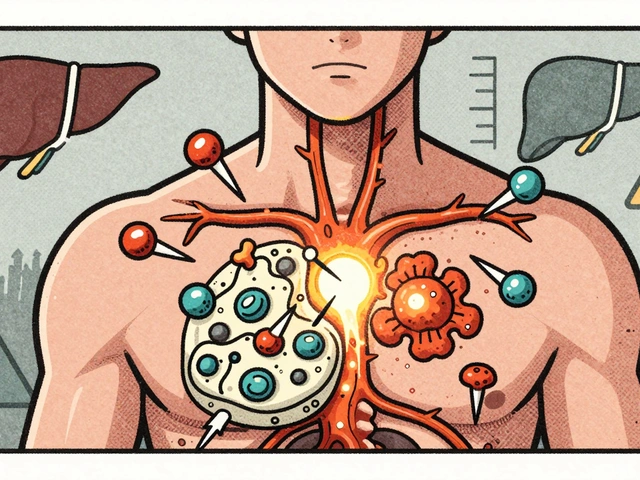Understanding Hemophilia and its Impact
As a caregiver, it is essential to understand what hemophilia is and how it can impact the life of our loved ones. Hemophilia is a rare genetic disorder that affects the blood's ability to clot. This means that even minor injuries can lead to severe bleeding and, in some cases, life-threatening complications. There are two main types of hemophilia – Hemophilia A and Hemophilia B – both of which are caused by the lack of specific clotting factors in the blood. Knowing the challenges that our loved ones face every day can help us better support them and adapt to their needs.
Recognizing Signs and Symptoms
Being able to recognize the signs and symptoms of a bleeding episode is crucial for caregivers of individuals with hemophilia. Some of the common signs include unexplained bruises, joint swelling and pain, prolonged bleeding after an injury, and blood in urine or stool. When we are familiar with these symptoms, we can act quickly to seek medical attention and prevent further complications. It is also essential to educate our loved ones about these signs, as they may not always be aware of a bleeding episode occurring.
Preventing Injuries and Bleeding Episodes
Prevention is key when it comes to managing hemophilia. As caregivers, we can take several steps to help minimize the risk of injuries and bleeding episodes for our loved ones. Encouraging them to wear protective gear during physical activities, ensuring their living environment is safe and free of hazards, and teaching them to be cautious when handling sharp objects are just a few examples. Additionally, we should encourage a balanced diet and regular exercise to help maintain overall health and well-being.
Administering Medication and Home Infusions
One of the main treatments for hemophilia is the administration of clotting factor concentrates through infusions. These infusions may be done at a healthcare facility or, in some cases, at home. As caregivers, it is essential to learn how to administer these infusions and recognize any potential complications, such as an allergic reaction or the development of inhibitors. Properly administering medication and managing home infusions can help ensure the best possible outcomes for our loved ones with hemophilia.
Managing Pain and Discomfort
Individuals with hemophilia often experience pain and discomfort, particularly in their joints, due to recurrent bleeding episodes. As caregivers, we should be aware of various methods to help manage this pain, such as over-the-counter pain relievers, applying ice packs, and gentle exercises or stretches. It is important to discuss these methods with a healthcare professional to determine the most appropriate approach for our loved ones.
Building Emotional Support and Resilience
Living with hemophilia can be emotionally challenging, not only for the individual but also for their caregivers. It is crucial to build a strong support system for our loved ones, including family, friends, and healthcare professionals. Encouraging open communication, providing reassurance, and seeking professional counseling when needed can all contribute to fostering emotional resilience and well-being for both the individual with hemophilia and their caregivers.
Navigating School and Work
Individuals with hemophilia may face unique challenges in school and work settings. As caregivers, we can play a critical role in advocating for our loved ones and ensuring they receive the necessary accommodations and support. This may include working with teachers and school administrators to develop an individualized education plan (IEP) or collaborating with employers to create a safe and inclusive work environment. By being proactive and involved, we can help our loved ones thrive in these settings.
Planning for the Future
While hemophilia is a lifelong condition, advances in medical treatments and management strategies have significantly improved the quality of life for individuals with this disorder. As caregivers, it is essential to plan for the future and ensure our loved ones continue to receive the care and support they need. This may involve discussing long-term care options, financial planning, and establishing a support network of healthcare professionals and other caregivers. Through careful planning and preparation, we can help our loved ones with hemophilia lead fulfilling and independent lives.








7 comments
Joe Puleo
I've helped a few families manage home infusions, and the biggest win is making it routine. Keep the supplies organized, label everything, and don't be afraid to ask the nurse for a demo. It gets easier than you think. Trust me, the first time is the hardest.
Also, keep a little logbook - even just a notes app on your phone. You'll thank yourself later when the doctor asks about patterns.
Ben Jackson
The joint bleeds are the silent killers. I've seen guys in their 30s with arthropathy because no one caught the micro-bleeds early. Prophylaxis isn't optional - it's the baseline. And yeah, PT isn't just for rehab, it's for maintenance. Stretching after infusion? Non-negotiable.
Also, ice packs > NSAIDs. Always. Ibuprofen is a blood thinner, folks. Don't make the same mistake my cousin did.
Keith Bloom
lol so you're telling me we're supposed to treat hemophilia like it's a lifestyle brand now? 'Support your loved one's clotting journey'... ugh. I've met people with this who still play basketball and hike. Stop coddling them. The real issue is insurance denying factor VIII. Not your emotional labor.
Shubham Singh
I remember when my brother had his first knee bleed at 14. I was 16 and thought it was just a sprain. We waited three days before going to the ER. He was in a wheelchair for a month. Now I cry every time I see someone say 'it's just a bleed.'
You don't know what it's like until you've held someone down while they scream because their joint is filling with blood and you can't do anything but beg the hospital to hurry.
And then you learn to inject. And then you learn to sleep with one ear open. And then you realize you're not just a brother - you're a damn medical technician who never got paid.
I don't need a blog to tell me this. I live it. Every. Single. Day.
Meredith Poley
Oh, so now we're giving out gold stars for not letting your kid die from a stubbed toe? Congrats, you're a parent. Try again when you've spent $120k a year on factor and still had to fight your insurer for a home infusion kit.
Bhanu pratap
To everyone saying 'just give them the factor' - you're missing the point. It's not just the medicine. It's the fear in their eyes when they wake up with a swollen ankle and don't know if it's a bleed or just a bad night's sleep. It's the guilt they feel when they can't play with their niece. It's the way they smile and say 'I'm fine' even when they're shaking.
We don't need more checklists. We need more heart. More presence. More 'I'm here' instead of 'here's what you should do.'
Mathias Matengu Mabuta
Your post is a textbook example of performative caregiving. You cite academic sources with hyperlinks, yet you never once mention the 30% mortality rate for untreated intracranial bleeds in pediatric cases. You avoid discussing inhibitor development, which occurs in 25-30% of severe Hemophilia A patients. You romanticize 'emotional resilience' while ignoring systemic failures in Medicaid reimbursement. This is not support - it's therapeutic paternalism dressed in HTML.